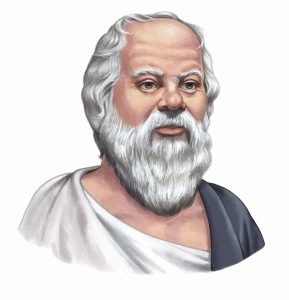Scrutinising Beliefs: Where Socrates Meets William Kingdon Clifford
Scrutinising Beliefs: Where Socrates Meets William Kingdon Clifford
Ah, the age-old quest for knowledge, a journey that invites us to question not only the world around us but also the very fabric of our convictions. In this fascinating exploration, we’ll journey through the philosophic corridors where Socrates, the Athenian skeptic, crosses paths with William Kingdon Clifford, the Victorian ethicist. Brace yourselves for an intellectual romp that’s part epistemology, part ethics, and wholly engaging.
The Cornerstone: Socrates
Socrates, the man who turned Athens into his personal philosophy classroom, is a cornerstone figure in the study of epistemology. Despite never writing a single word himself, his methods and teachings have been immortalised through the accounts of his students, primarily Plato.
Socrates initiated what we know today as the Socratic method—a form of inquiry and debate that’s built on cross-examination. At its core is elenchus, a dialectical technique designed to unravel the assumptions that lie beneath our beliefs. The aim? To reach a clearer understanding of a concept or to unveil the flaws and contradictions in one’s own thinking.
Socrates was famous for his humility, encapsulated by the phrase, “I know that I am intelligent, because I know that I know nothing.” His relentless questioning set the benchmark for what qualifies as genuine knowledge. According to Socrates, beliefs must be able to withstand rigorous scrutiny to be considered knowledge. This sentiment aligns well with Clifford’s future claims, but we’ll get to that in a bit.
The Ethical Dimension: William Kingdon Clifford
Fast forward a couple of millennia to 19th-century Britain, and we meet William Kingdon Clifford, an intellectual powerhouse who added an ethical dimension to our understanding of belief. In his provocative essay, “The Ethics of Belief,” Clifford asserts, “It is wrong always, everywhere, and for anyone, to believe anything upon insufficient evidence.”
According to Clifford, our beliefs are not just personal convictions but ethical obligations. He argues that we have a moral duty to ensure our beliefs are well-grounded, as they guide our actions and shape our impact on society. Believing something without adequate evidence isn’t just intellectually lazy; it’s morally irresponsible.
Where Socrates and Clifford Intersect
What happens when you put Socrates’ relentless pursuit of truth alongside Clifford’s ethical framework? You get a compelling viewpoint: the quest for knowledge isn’t merely an intellectual endeavour but a moral one too. Both philosophers urge us to examine what underpins our convictions. While Socrates focuses on the method of questioning to unearth foundational truths or expose ignorance, Clifford insists that we have an ethical responsibility to do just that.
Both men add invaluable perspectives to the field of epistemology. Socrates kickstarted the conversation, stressing the importance of admitting one’s ignorance as a first step toward gaining true knowledge. Clifford took it a step further, infusing ethics into epistemology by emphasising the moral implications of our beliefs. In essence, it’s not enough to ‘just believe’; one must have sound reasons for those beliefs, grounded in careful thought and evidence.
Conclusion: The Ethics of Collective Assumptions and Beliefs in Organisations
Stepping away from ancient Athens and Victorian England, let’s bring this dialogue into the boardrooms and office corridors of today’s organisations. What happens when the scrutinising lens of Socratic inquiry and Cliffordian ethics is focused on the collective assumptions and beliefs that often go unexamined in corporate culture? The implications are profound.
Just as individuals have a moral and intellectual obligation to scrutinise their beliefs, so too do organisations when it comes to surfacing and reflecting on collective assumptions and beliefs. Whether it’s a company ethos, a mission statement, or the unwritten rules that govern interpersonal dynamics, these collective beliefs shape actions, decisions, and ultimately, the organisation’s impact on society.
In an organisational setting, failing to question and validate collective assumptions isn’t just a strategic misstep—it’s an ethical lapse. Unexamined beliefs can perpetuate inequality, stifle innovation, and even lead to large-scale ethical failures. These are not just abstract notions but real-world consequences that affect stakeholders, employees, and communities at large.
Just as Socrates and Clifford call for individual rigour in belief formation, their philosophies urge organisations to institutionalise a culture of questioning and ethical responsibility. By doing so, organisations not only elevate their ethical standing but also sharpen their strategic focus, rooted in beliefs that have been examined, challenged, and validated.
In a nutshell, scrutinising collective beliefs and assumptions in an organisation isn’t just good governance; it’s a moral imperative. The quest for organisational clarity and ethical conduct is a continuous process—one that requires us to ask tough questions and demand evidence for the answers we receive. When it comes to shaping an ethical and effective organisation, both the questioning and the answers are indispensable.


